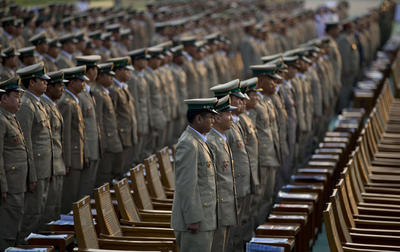A breakdown in the peace process is the problem most likely to push the transition off the rails. The efforts being made by the Thein Sein government to negotiate a durable peace with the country’s ethnic minorities, after more than six decades of civil war, are serious and commendable. By some accounts, agreement has been reached on 80 per cent of the issues. It is not unusual in such delicate negotiations, however, for the last 5 per cent of the issues to be as difficult to resolve as the first 95 per cent.
Standing in the way of success in the peace process — as well as most other aspects of the transition to better governance — is the government’s apparent inability to control the guns. Has there ever been a successful transition in which the government does not have authority over the military and the police? As it stands, there is little evidence that the Thein Sein government has real control over the arms in the hands of the Tatmadaw (Myanmar’s armed forces) or the police.
In the successful transitions in Asia over the past 50 years, the guns have been controlled by a reformist commander-in-chief of the armed forces or a party (communist, in most instances). Rent-seeking activities by gun-bearing units have been curtailed and budgets for weaponry have been constrained. But it has taken a generation or more in these countries to develop professional military and police structures that do not rely on off-budget sources of revenue. What is the basis for believing it will take any less time in Myanmar?
Three related problems also have the potential to derail the transition.
First is the issue of constitutional amendment. The Thein Sein government is publicly committed to amending the 2008 Constitution to make the political system more democratic and to strengthen basic human rights. The issue with the highest visibility is removing provisions that might prevent Aung San Suu Kyi from becoming president. But a more fundamental issue is the devolution of power from the central government to the seven Bamar-majority ‘regions’ and the seven ethnic minority ‘states’, plus several special administrative areas. Even the nomenclature is divisive. An arguably more ‘nationalist’ solution would be to label all of the first-level areas ‘provinces’, redraw the existing boundaries, and create as many as 10 new provinces (Cambodia has 23 with a quarter of the population).
Getting the Constitution amended before the 2015 election would be a great step forward, but it requires a nation-wide referendum and there may not be enough time left to reach a consensus on the amendments and hold the referendum. Given the cost, a case can be made for scheduling the referendum concurrently with the election of union-level and lower-level representatives.
Second is the census. The last census in Myanmar was in 1983, but it did not fully meet international standards. The last credible census was in the 1930s when Myanmar (Burma) was still a British colony. The Thein Sein government decided two years ago to conduct a new census and it has been working closely with experts from the UN, other multilateral institutions, and a number of donor countries to design and carry out a census over 12 days beginning 30 March 2014. However, there are potentially explosive aspects of the census process, especially a question that requires respondents to select one ethnic identity among the 135 official ‘national races’ and an ‘other’ option. Given the controversy this provision has already created, a more sensible approach might be to eliminate the question in the census and then after the 2015 election do a sample survey of ethnic identity with a shorter and less controversial list of options (including ‘mixed’).
Third is the problem of land grabbing. Without any or only token compensation, millions of acres of land were taken away from longstanding owners by rich and powerful people under the military junta that ruled Myanmar from 1988 to 2011. Such land grabbing has continued under the Thein Sein government despite its commitment to the principles of due process and just compensation. Very few low-income countries have been able to stop socially destabilising land grabbing. Even authoritarian regimes like China’s struggle with this problem. It is simply not feasible for Myanmar to establish a trustworthy land registration and transfer system before the 2015 election.
The Tatmadaw and the police have strong interests in all three of these problems — interests that are more likely to delay solutions than advance them.
Ironically, the rapidly rising flows of foreign aid and foreign investor interest in Myanmar may also contribute more to derailing the transition than advancing it. Foreign visitors are pre-empting too much of the time of senior officials in the Thein Sein government. While the general thrust of the government’s policies has been close to brilliant, they will only improve lives if they are implemented effectively. Effective implementation requires a monumental cultural change in the bureaucracy, and right now it looks as though the government’s ministers and director generals are not spending enough time on implementation.
Myanmar’s friends around the world want the transition to succeed. They tend to focus on the good news and discount the bad news. There is plenty of good news on the surface, but there are some underlying realities that may be intractable in the near term.
Lex Rieffel is a Nonresident Senior Fellow at The Brookings Institution, Washington DC.

